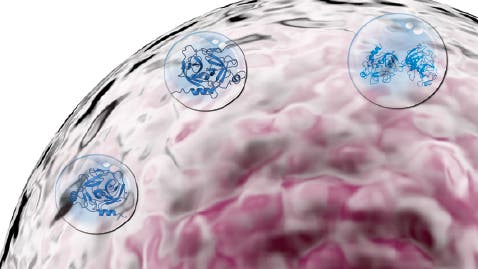Jun 28: PhD research on killer cell granzymes sheds new light on cancer development, immunoregulation and immunotherapy

Research at the Department of Pathology at UMC Utrecht has further unraveled the role of killer cell granzymes in cancer development, immunoregulation, and immunotherapy. Fresh PhD Shuang Li concluded that continued exploration of both intracellular and extracellular granzyme functions has the potential to facilitate (immune-)therapy in the treatment of cancer patients.
A family of cytotoxic lymphocytes are the killer cells of the immune system that attack tumor cells. Current cancer immunotherapy aims to reinforce these killer cells that use a set of pro-apoptotic granzymes to destroy cancer cells. However, the killing potential and relative contribution of all five human granzymes in tumor elimination during immunotherapy as well as the extracellular roles of tumor microenvironment-associated granzymes in tumorigenesis and cancer immunity largely remain unclear. Better knowledge on these issues may not only unravel novel mechanistic insights on how the immune system works, but also may open new cancer (immuno)therapeutic avenues. In this PhD thesis, Shuang Li (Department of Pathology, UMC Utrecht) and colleagues aimed to investigate the functions of intracellular and extracellular granzymes in tumor elimination, tumor progression, and tumor immunity.
Cytotoxic role
In one of her experiments, Shuang Li used a systematic granzyme knockout strategy in natural Killer (NK) cells to explore the cytotoxic role and relevance of individual granzymes in a cellular setting of breast cancer immunotherapy. These results indicate that NK cells use only partially overlapping sets of granzymes to kill breast cancer cells and that the required granzymes depend on the breast cancer cell subtype. Furthermore, the data suggest a previously unknown cooperation of killer cell granzymes in breast cancer immunotherapy.
Inhibition of angiogenesis
She also showed that extracellular granzyme K (GrK) can inhibit angiogenesis via secretion of sVEGFR1 from endothelial cells, thereby sequestering VEGF-A and impairing VEGFR signaling. The observation that GrK positively correlates with sVEGFR1 and negatively correlates with angiogenesis in colorectal cancer, suggest that the GrK-sVEGFR1-angiogenesis axis may be a valid target for development of novel anti-angiogenic therapies in cancer.
Checkpoint inhibition
Li studied the immune checkpoint B7-H3 expression in a tissue cohort of human pediatric medulloblastoma (MB). B7-H3 protein expression was found in 23 out of 24 (96 percent) human pediatric MB cases and 17 out of 24 (71 percent) MB cases had >25 percent of tumor cells with B7-H3 expression. Thus, immune checkpoint B7-H3 is differentially expressed by the large majority of pediatric MB patients. This further warrants the development of novel B7-H3-directed (immuno)-therapeutic methods for children with incurable, metastatic, or chemo-resistant MB.
Shuang Li summarizes: “My thesis proposes new roles of killer cell granzymes in cancer development, immunoregulation, and immunotherapy. Further exploration on this effector immune response is required to facilitate novel immunotherapeutic strategies in cancer treatment.”
PhD defense
Shuang Li (1989, Changchun, China) defended her PhD thesis on June 28, 2022 at Utrecht University. The title of her thesis is “Role of granzymes in cancer development, immunoregulation, and immunotherapy”. Supervisors were prof. dr. Niels Bovenschen (Department of Pathology and Center for Translational immunology, UMC Utrecht) and prof. dr. Roel Goldschmeding (Department of Pathology, UMC Utrecht).
